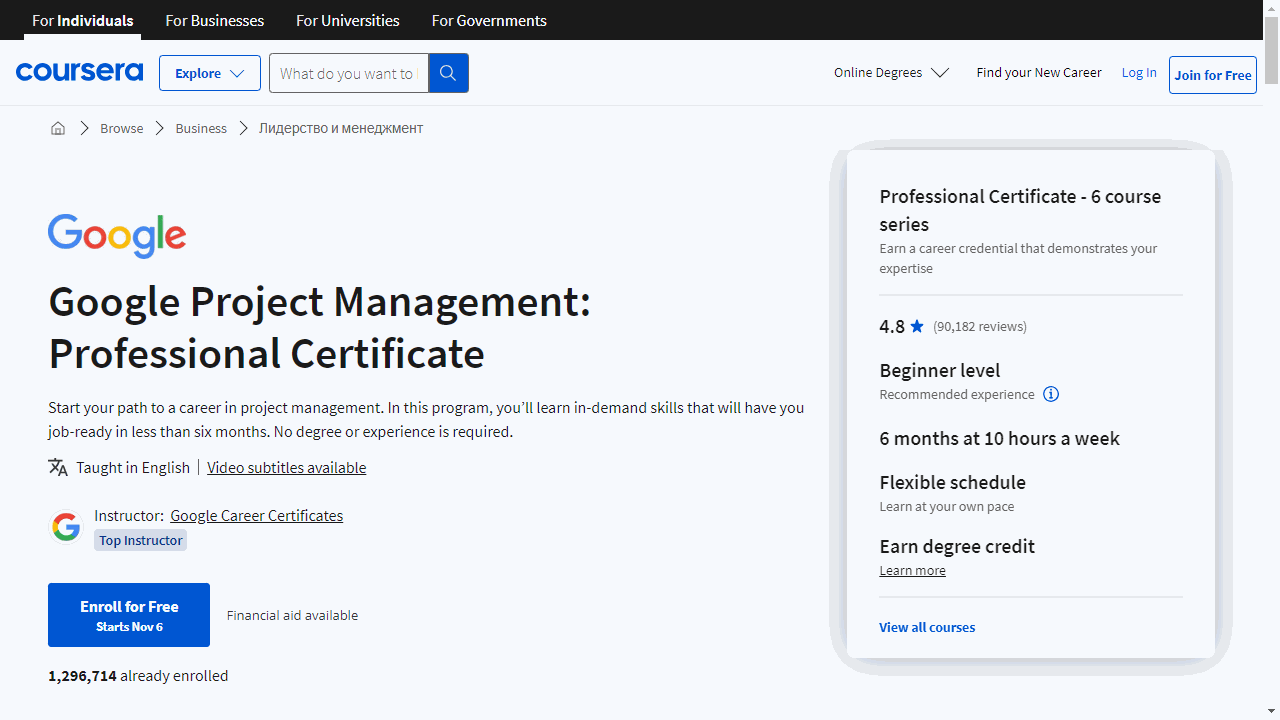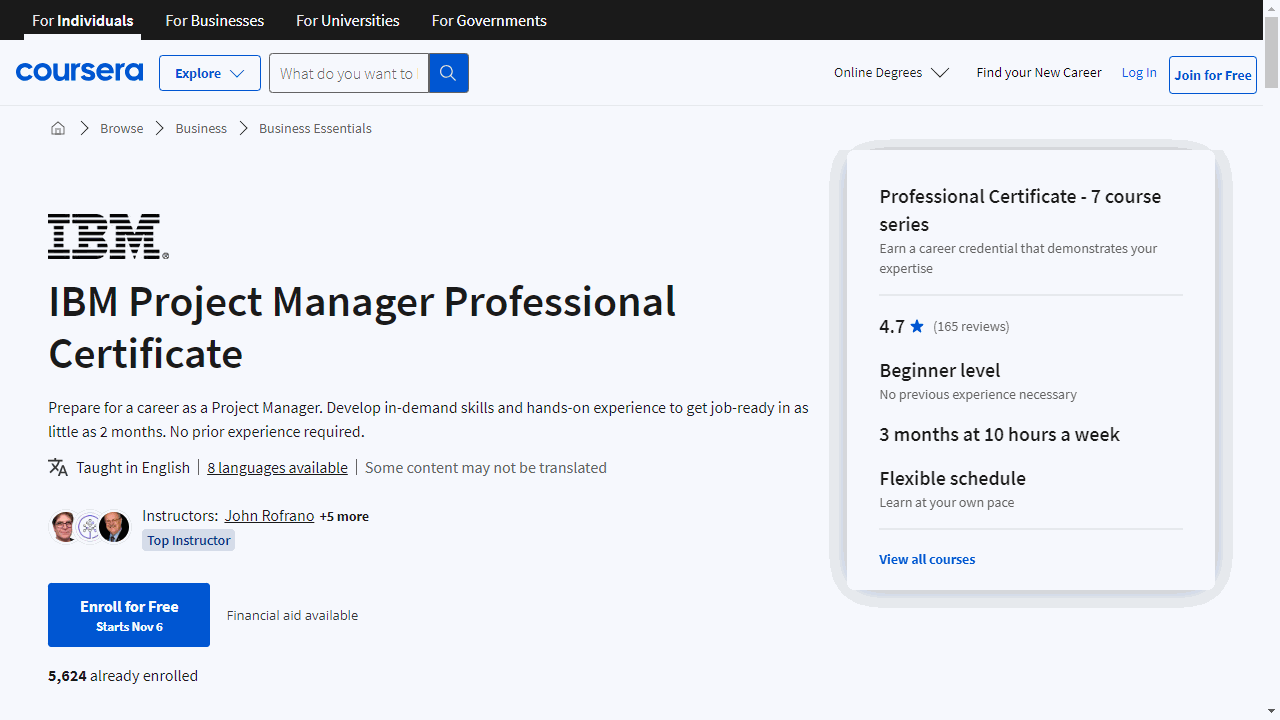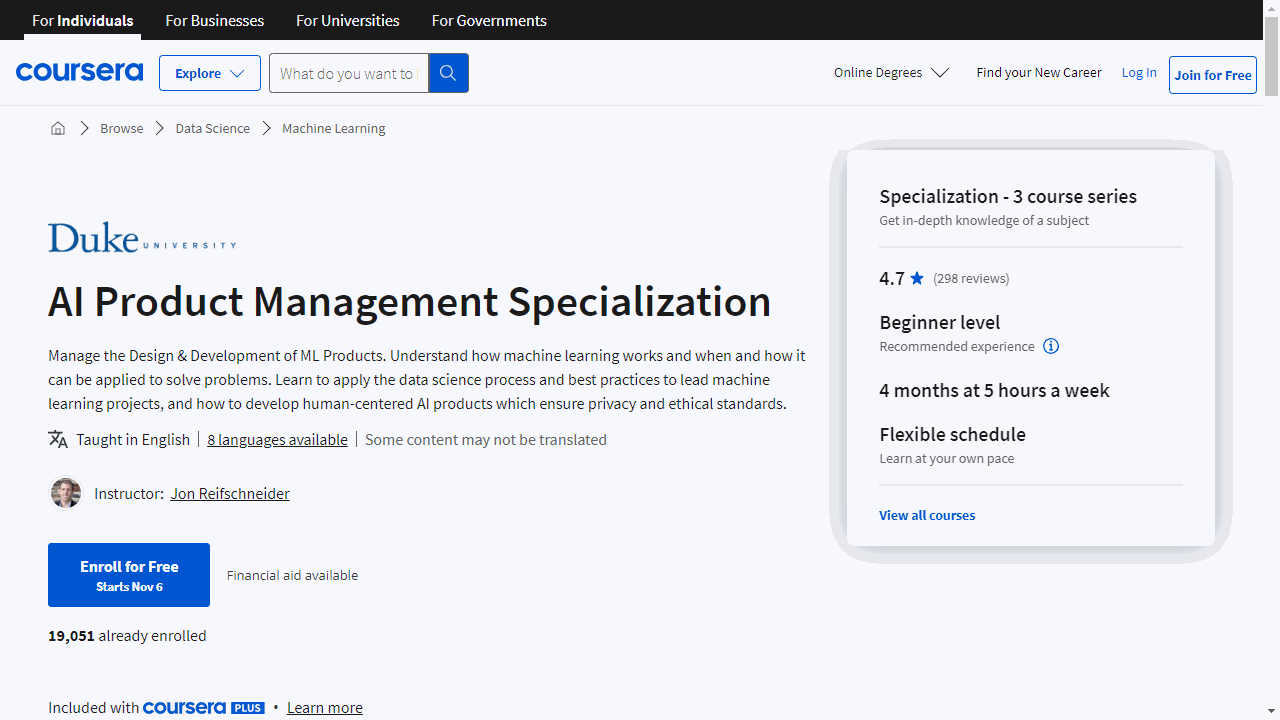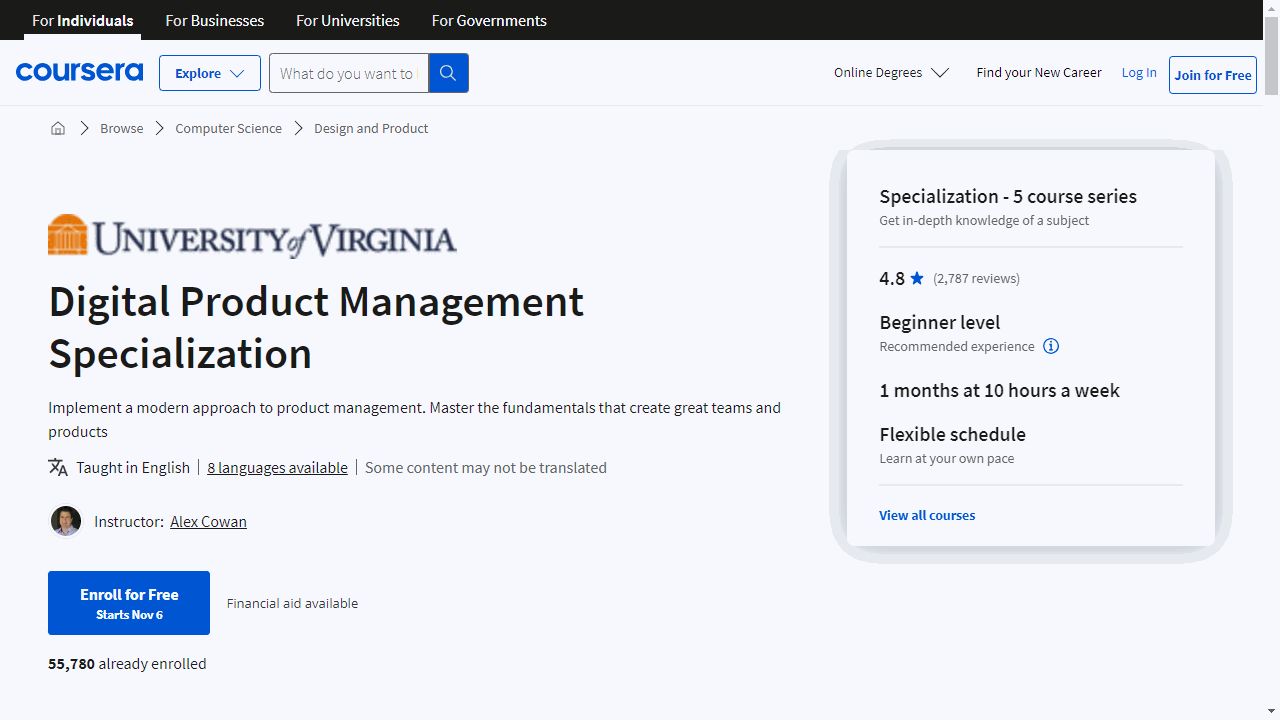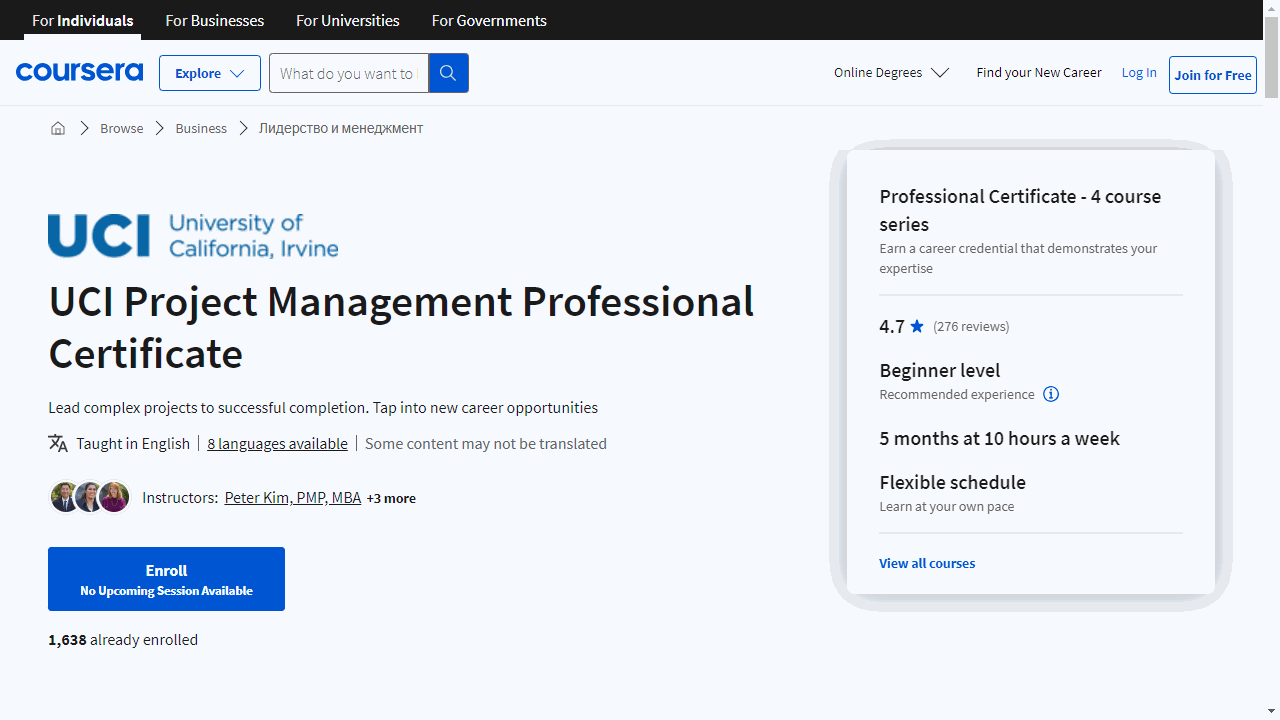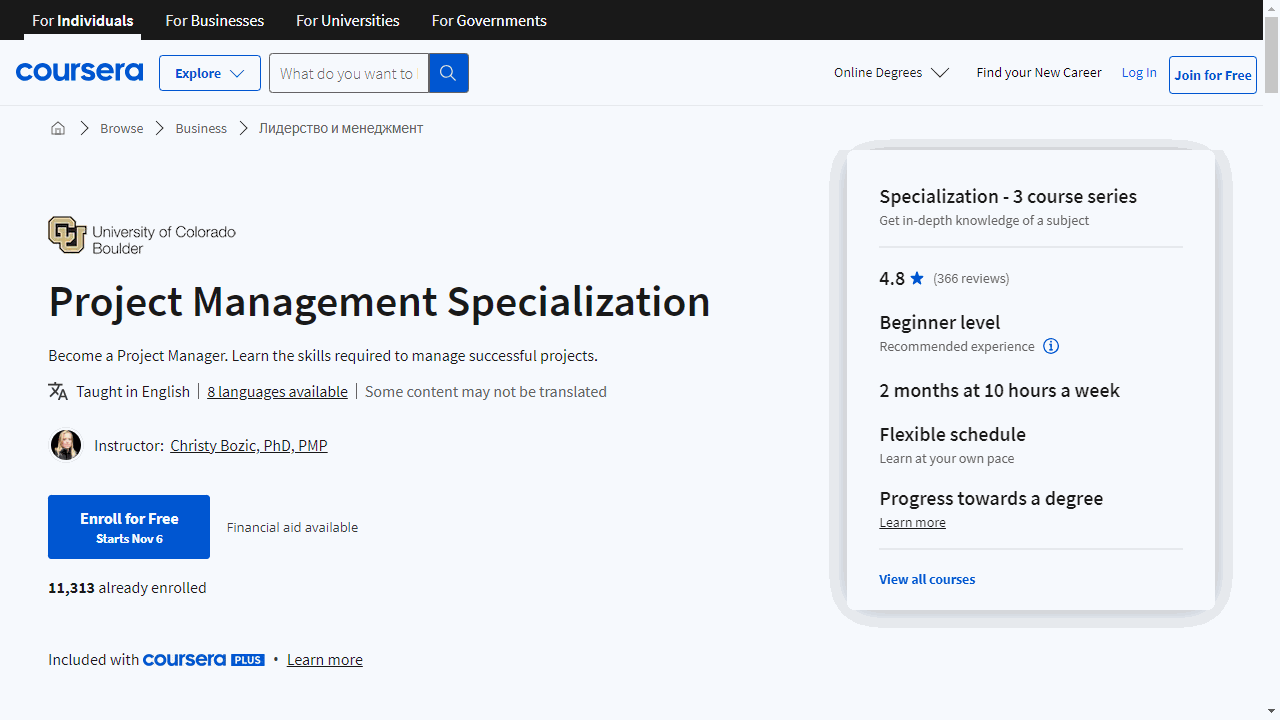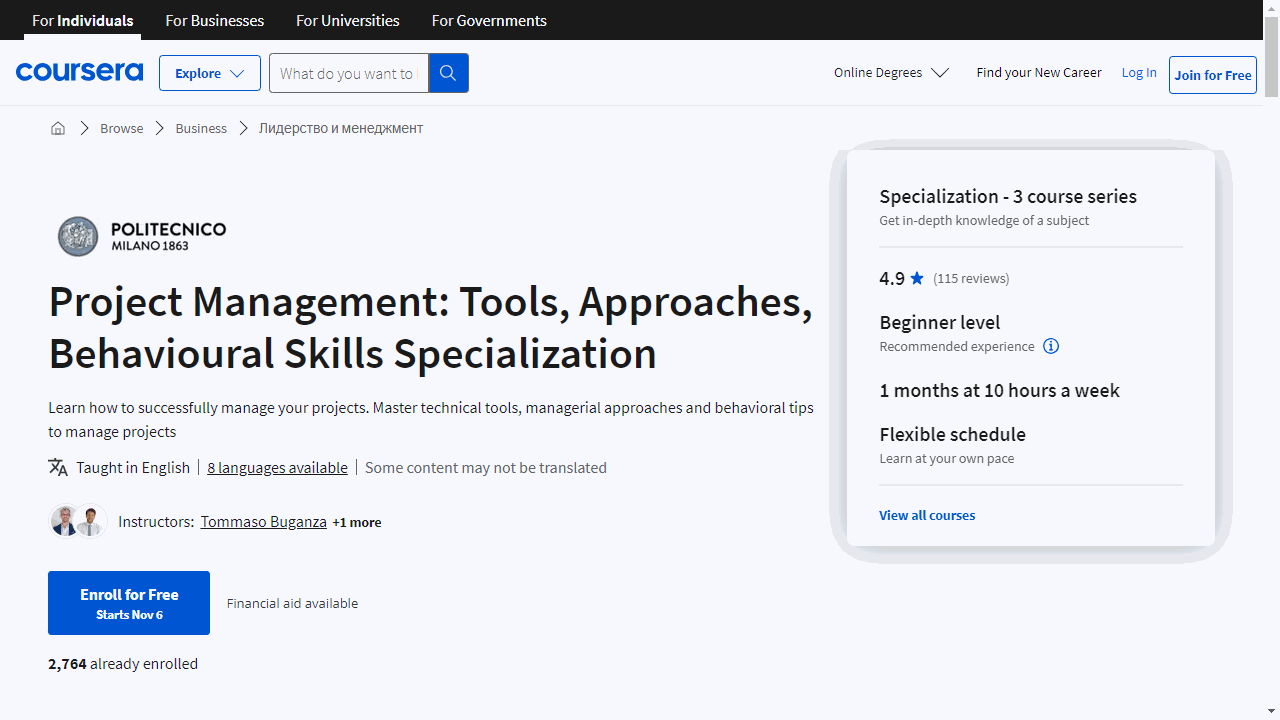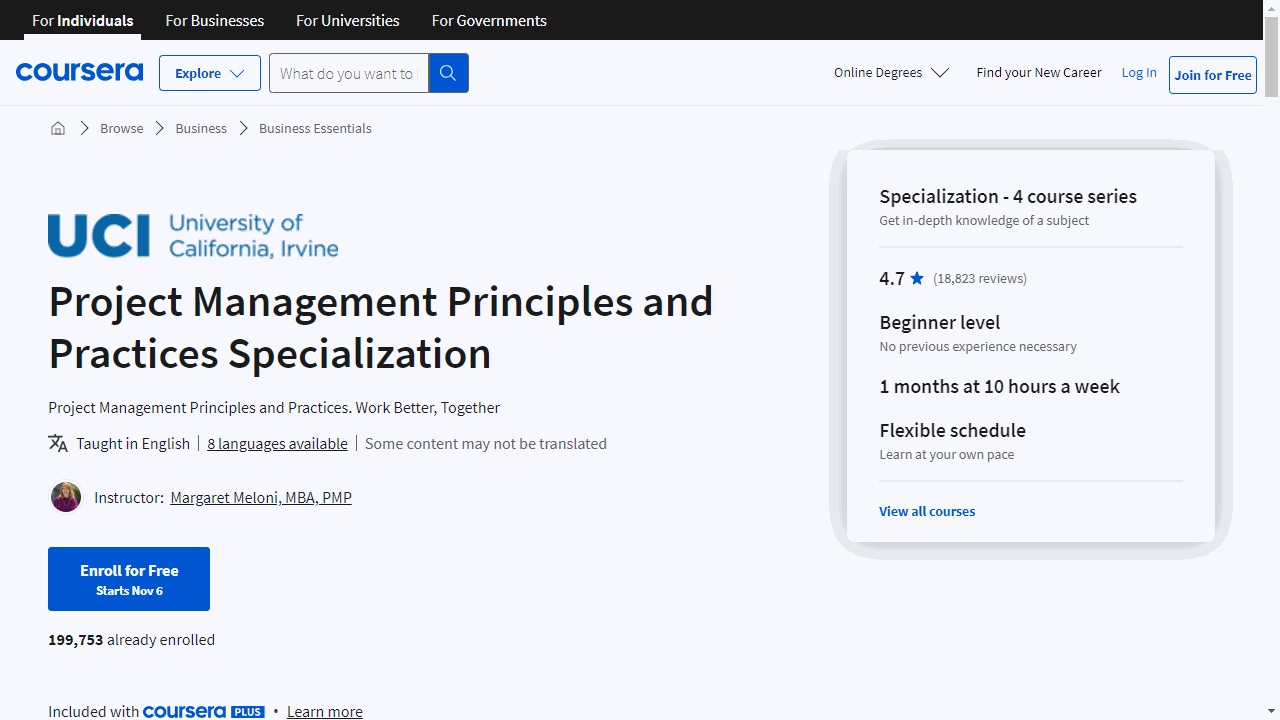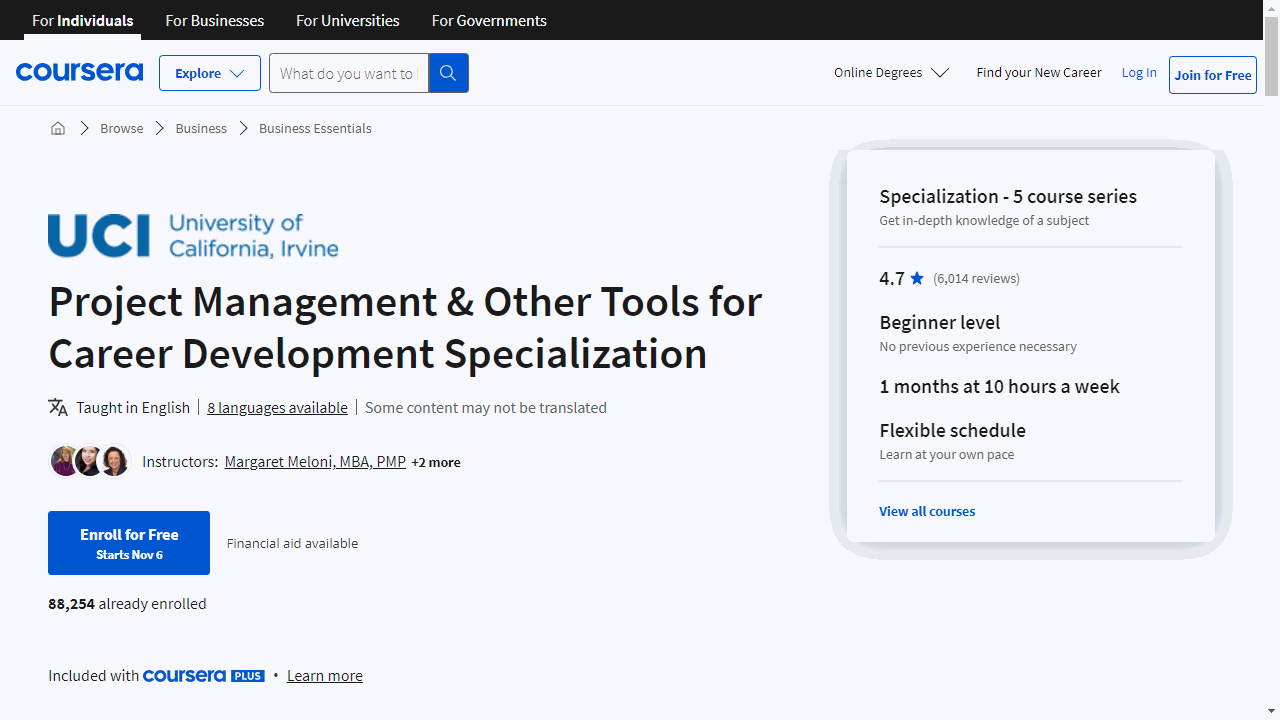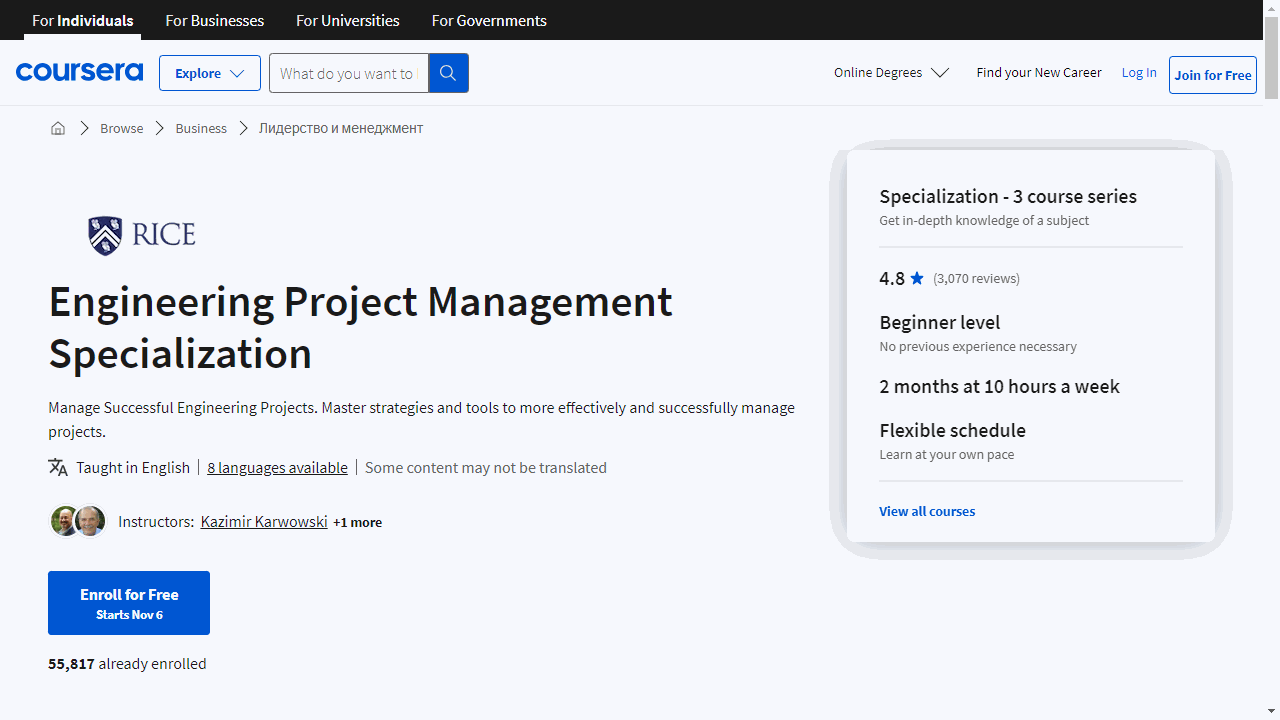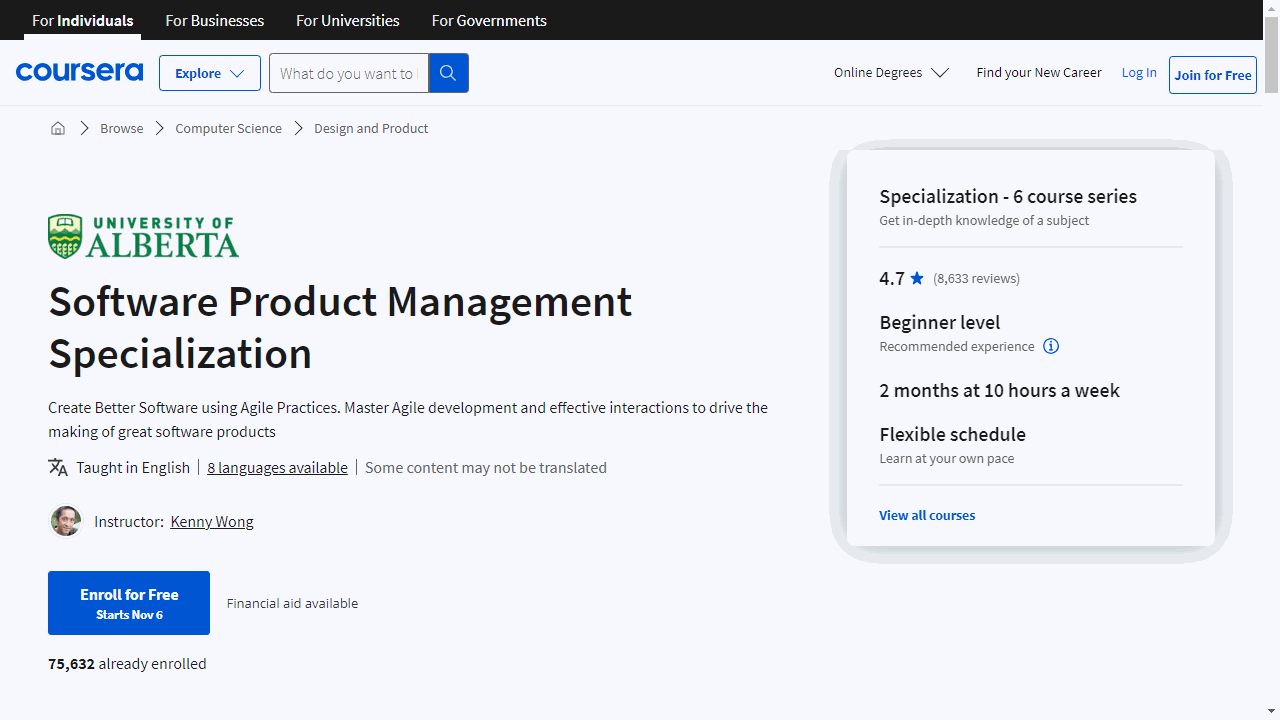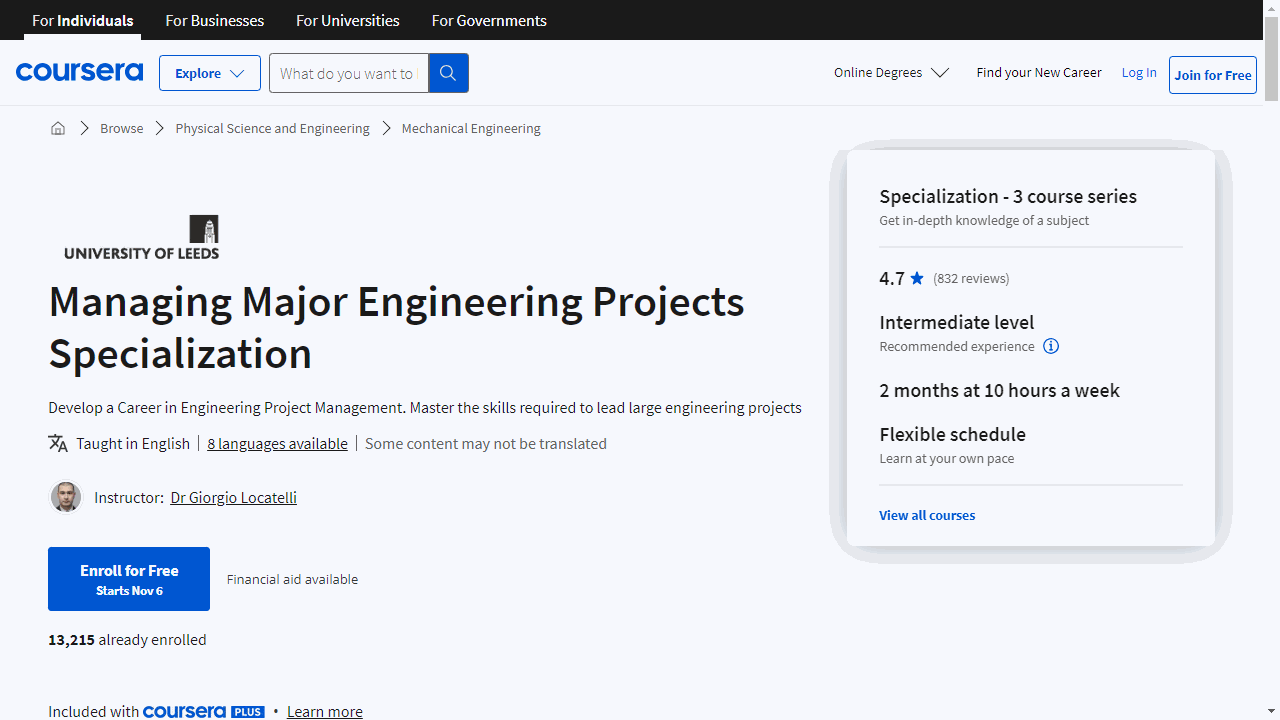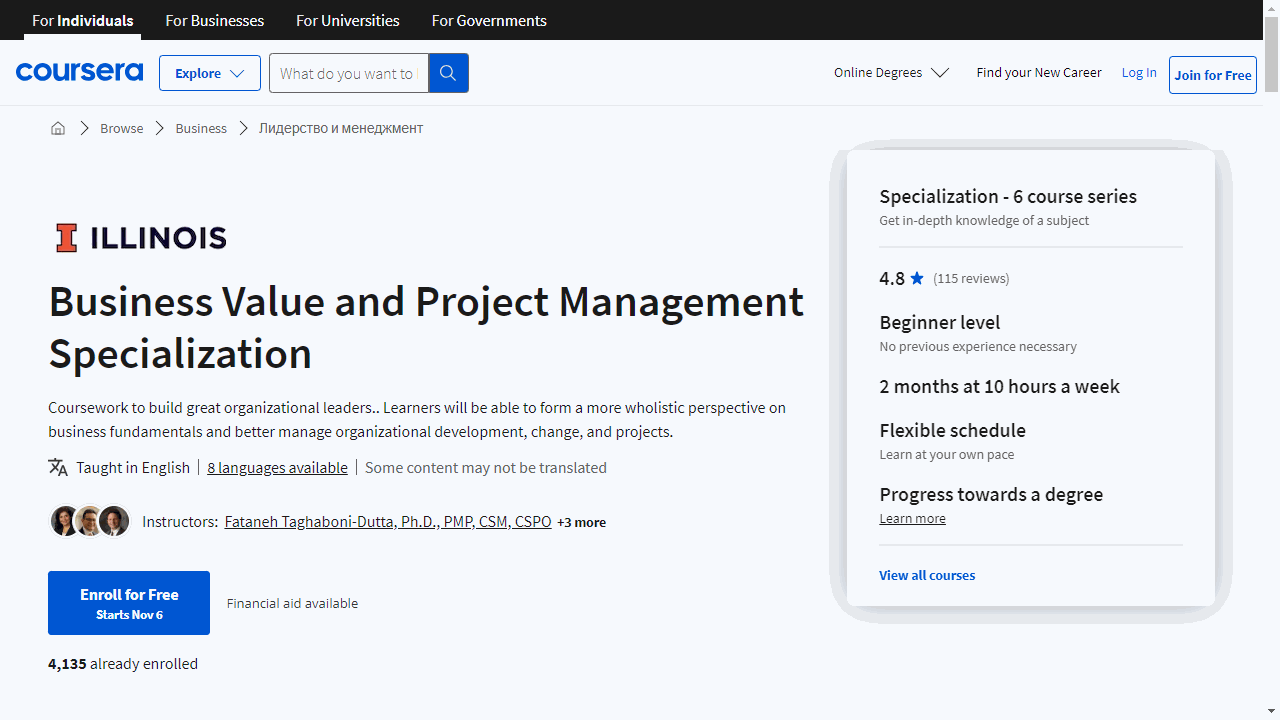Project management is a crucial skill for anyone who wants to lead successful projects, whether in a corporate setting, a non-profit, or even personal life.
By mastering project management techniques, you can learn to effectively plan, organize, and execute projects, keeping them on schedule and within budget while delivering high-quality results.
This ability to handle projects efficiently is highly valued by employers, making project management a valuable asset for any career path.
Finding the right project management course on Coursera can be a challenge.
With so many options available, it’s hard to know which one will provide the most comprehensive and relevant training for your needs.
You want a course that’s engaging, taught by experts, and tailored to your specific learning style and career goals.
For the best project management course overall on Coursera, we recommend Google Project Management: Professional Certificate.
This program offers a comprehensive six-course journey designed to equip you with the skills and knowledge needed to excel in modern project management.
Google PMs share their insights and real-world experiences, providing actionable techniques and practical tools that are directly applicable to today’s work environments.
Upon completion, you’ll earn a certificate from a world-leading tech company, which can significantly boost your career prospects.
While Google Project Management: Professional Certificate is our top pick, there are other excellent options available on Coursera.
Keep reading to explore our recommendations for various learning styles, skill levels, and career goals, including courses focusing on specific project management methodologies and industry applications.
Google Project Management: Professional Certificate
Google’s Project Management Professional Certificate offers a complete education in modern project management.
Throughout the six courses, you’ll gain both hard and soft skills needed to lead projects and teams in any industry.
The program starts with “Foundations of Project Management”.
Here you’ll get oriented with PM terminology, roles, and responsibilities.
You’ll also preview potential career paths to motivate your learning.
Next is “Project Initiation”, where you’ll master starting projects right by defining goals, scope, stakeholders, and charters.
Practical templates help you set expectations and assign responsibilities.
“Project Planning” dives into building plans and budgets.
You’ll learn to estimate timelines, procure resources, assess risks, and draft communications plans. Industry tips and tools simplify complex planning.
In “Project Execution”, you’ll discover techniques to track work, manage changes, ensure quality, improve processes, analyze data, and lead teams through the realities of running a project.
“Agile Project Management” explores faster, flexible approaches like Scrum.
You’ll learn key events, backlogs, roles, and coaching strategies to adapt PM frameworks.
Finally, an immersive Capstone enables you to apply your new expertise through real-world exercises. You’ll build a portfolio to showcase career readiness.
Throughout the certificate, Google PMs share insider perspectives.
The skills are practical and actionable, rooted in data, tools, and workflows used every day by Google teams.
Upon completion, you’ll earn a certificate from a world-leading tech company.
It also gives you the foundations to pursue project management certifications like the PMP (Project Management Professional) or CAPM (Certified Associate in Project Management).
IBM Project Manager Professional Certificate
The program covers everything from project initiation and planning to risk management, Agile methodologies, and leadership.
You’ll gain practical experience through hands-on labs and realistic scenarios.
By the end, you’ll produce professional project documents like risk registers, user stories, and burndown charts to showcase in your portfolio.
The introductory course provides a comprehensive overview of project management.
You’ll learn the key responsibilities of a project manager and recent trends shaping the field. It also explores the various career paths and skillsets this exciting field offers.
From there, you’ll master project initiation, planning, and scoping.
Courses cover predictive and adaptive models so you can manage any project.
You’ll create essential documents like project charters, briefs, and schedules. Stay on top of risks with courses in risk analysis and response strategies.
The course about communication, stakeholder engagement, and leadership will equip you with the soft skills critical for project success.
You’ll also dive into Agile methodologies like Scrum and Kanban.
Finally, you’ll synthesize everything in a capstone project.
You’ll assume the PM role and manage a project end-to-end, creating key deliverables.
This comprehensive experience will demonstrate your abilities to employers.
An added bonus is a simulated exam to help you prepare for the CAPM (Certified Associate in Project Management) certification.
AI Product Management Specialization By Duke University
The 3 courses will give you a rock-solid foundation in AI and machine learning concepts.
You’ll learn how ML models work under the hood, when to apply them, and how to manage ML projects from start to finish.
In the first course, you’ll get a beginner-friendly intro to core ML algorithms and techniques.
No coding required! The focus is on building intuition about how models like neural networks actually learn from data.
The second course walks you through the full life cycle of an ML product - from identifying opportunities to model building, testing, and deployment.
You’ll gain best practices for organizing data science projects.
The Specialization rounds out with a deep dive into the human side of AI.
You’ll learn strategies for designing ethical, transparent ML systems that customers can trust.
Privacy, bias, and augmenting human intelligence are all covered.
By the end, you’ll have the skills to shepherd ML products from conception to delivery.
You’ll know what it takes to build AI that solves real problems for users.
Digital Product Management Specialization By UVA Darden
The first course, “Digital Product Management: Modern Fundamentals”, teaches you the modern methods product managers use today.
You’ll learn how to create focus, prioritize features, and lead cross-functional teams.
This is critical, as product managers now steer the ship on digital products.
Next is “Agile Meets Design Thinking”. This course shows you how to create valuable products users want.
You’ll learn design thinking and agile development to build the right solutions. Testing narratives and prototypes with users ensures you deliver value early.
The third course, “Hypothesis-Driven Development”, focuses on experimentation.
You’ll learn how to identify the right questions and test just enough to avoid waste.
Pairing qualitative and quantitative analytics keeps you focused on meaningful outcomes for users.
“Agile Analytics”, the fourth course, shows you how to integrate analytics into agile iterations.
You’ll habitually tie work to actionable data that drives user value.
This course is crucial for focusing your agile team.
Finally, “Managing an Agile Team” teaches you to adapt agile practices for your team.
You’ll learn to align team focus with company strategy while encouraging creativity.
Facilitating retrospectives also allows continuous improvement of agile processes.
UCI Project Management Professional Certificate
This comprehensive program, offered by the University of California Irvine, covers the key principles outlined in the Project Management Body of Knowledge Guide (PMBOK® Guide).
In the “Project Launch” course, you’ll learn how to justify and select projects while managing stakeholder expectations.
Defining project scope and creating detailed work breakdown structures ensure you accurately estimate time and resources needed.
The “Project Planning” course dives into creating metrics, risk assessments, and cost estimates - critical knowledge before developing a schedule and budget.
Mastering these core planning skills means your projects stay on track.
Then, in “Project Execution”, you’ll discover how to adapt when the unexpected happens, adjusting plans while managing resources in both traditional and Agile environments.
The capstone course brings together everything you’ve learned.
Manage multiple projects and stakeholders while balancing priorities and resources.
Explore scheduling techniques to mitigate risk and keep stakeholders happy.
With real skills grounded in best practices, you’ll have the expertise to successfully manage projects in any industry.
Project Management Specialization
In the first course, you’ll gain a solid foundation in project management fundamentals.
You’ll learn how to define a project manager’s role, choose the right project management methodology, create a project charter, manage stakeholders, and build an effective team.
These fundamental skills align with the Project Management Institute’s (PMI) standards and the topics covered in the Project Management Professional (PMP) certification exam.
The second course focuses on planning and executing traditional engineering projects.
You’ll develop expertise in creating project schedules, estimating costs and budgets, assessing risks, and applying quality tools.
With these vital skills, you’ll be able to steer projects through the planning and execution phases while meeting time, budget, and quality targets.
The third course introduces Agile project management.
You’ll learn the Scrum framework, how to deliver projects iteratively, and the benefits of providing value early.
Understanding Agile principles will make you a more adaptable and empowering project leader.
The instructors from the University of Colorado Boulder bring real-world expertise into a flexible, online format.
Whether you’re an engineer, scientist, or technical professional looking to transition into leadership, these courses will boost your confidence in guiding any project to success.
Project Management: Tools, Approaches, Behavioural Skills Specialization
The first course on project management fundamentals will give you a strong foundation.
You’ll learn how to identify key project variables and pick the best organizational structure.
Understanding projects versus processes is key for anyone in a business setting.
Building on that base, the second course focuses on critical project planning skills.
Discover how to manage each phase of the project lifecycle.
Practical instruments like the Scope Statement, Work Breakdown Structure, and Gantt Chart will help you define, organize, and schedule project work.
Applying these will make you a more effective planner.
In the third course, you’ll master techniques like Earned Value Management.
Knowing indicators for time, cost, and risk will help you make smarter decisions when issues crop up. Replanning will become second nature.
Project Management Principles and Practices Specialization
This comprehensive 4-course program will teach you everything you need to know to successfully manage projects from start to finish.
The first course covers initiating and planning projects.
You’ll learn how to identify key stakeholders, define project goals, and create a thorough project plan.
Key skills include stakeholder mapping, developing charters, creating work breakdown structures, and managing scope.
The second course focuses on budgeting and scheduling.
You’ll learn how to estimate costs, allocate resources efficiently, build activity schedules, and calculate critical paths.
Essential skills include cost estimation, budget management, activity sequencing, and schedule optimization.
The third course is all about assessing and controlling risks and changes.
You’ll learn risk analysis techniques, change control processes, and strategies for minimizing disruptions.
Crucial skills include risk prioritization, contingency planning, change impact analysis, and communication management.
The final course is a hands-on capstone project.
You’ll put your new skills to the test by creating plans for an actual project. This is great practice for real-world application.
Deliverables include charters, schedules, budgets, risk matrices, and more.
This Specialization packs a ton of project management best practices into an easy-to-digest curriculum.
The courses are well-structured with interactive elements to reinforce key learnings.
Project Management & Other Tools for Career Development Specialization
This specialization is another offering by the University of California Irvine.
In the first course, “Initiating and Planning Projects”, you’ll learn how to identify key project characteristics, constraints, stakeholders, and requirements.
This will help you create solid project plans to set your projects up for success.
Next is “Managing Project Risks and Changes”.
This course equips you to anticipate risks and effectively manage changes.
You’ll gain valuable skills in identifying, prioritizing, and responding to risks.
You’ll also learn to analyze and minimize the impacts of unavoidable changes.
Effective communication is essential for project managers. The “High-Impact Business Writing” course will refine your business writing abilities.
You’ll be able to craft compelling emails, reports, and presentations. Clear communication leads to smoother project delivery.
Negotiation skills are another must-have. “The Art of Negotiation” course explores different negotiation styles and tactics.
You’ll learn how to plan for negotiations and become a more persuasive negotiator. This helps manage stakeholder expectations.
The specialization wraps up with “Effective Problem-Solving and Decision-Making”.
You’ll master critical frameworks for analyzing problems, generating solutions, and making smart decisions. Being able to problem solve systematically is a hugely valuable skill.
Engineering Project Management Specialization
The first course covers critical initiation and planning concepts.
You’ll learn to assess previous projects, identify deliverables, perform stakeholder analysis, develop a project charter, and build a business case.
These skills will enable you to set clear project requirements and manage stakeholder expectations right from the start.
The second course dives into core scope, time and cost management.
You’ll gain practical techniques for creating a requirements document, project scope statement, work breakdown structure, critical path schedule, cost estimates, and earned value analysis.
With these tools, you’ll be able to decompose work, develop detailed project plans, and track performance.
The third course focuses on critical supporting elements like risk, quality, teams, and procurement.
You’ll identify positive and negative risks, develop risk mitigation plans, define quality standards, build a team management plan, and create procurement contracts.
Managing these intangibles is key to driving overall project performance.
Software Product Management Specialization
The introductory course gives you an overview of the critical role software product managers play in delivering quality products.
You’ll gain an understanding of Agile principles and how they lead to better software.
The second course dives into various software engineering processes and core Agile practices like Extreme Programming and Scrum.
You’ll learn when to apply different process models.
The third course teaches you practical techniques to elicit and express software requirements through client interactions.
You’ll maximize effectiveness through prototypes and adaptable requirements.
The fourth course covers turning requirements into plans.
You’ll map user requirements into developer tasks, assess risks, and estimate work.
These velocity-driven planning methods set you up for software project success.
As projects progress, reviews and metrics become critical.
The fifth course focuses on monitoring techniques to align clients, plans, and production.
Retrospectives and measurements will improve your process and product quality.
The specialization culminates in a capstone that gives you practical management experience through industry-inspired challenges.
You’ll apply your new Agile skills to interact with simulated clients and hone your software requirements abilities.
By the end, you’ll have the confident expertise needed to thrive as a software product manager.
Managing Major Engineering Projects Specialization
This three-course series provides you with the critical knowledge and expertise to successfully manage large-scale engineering projects.
In the first course, you’ll gain a deep understanding of major project performance.
You’ll examine key characteristics of major projects and learn to identify and mitigate bias and strategic misinterpretation - common causes of delays.
Case studies allow you to analyze cost and time performance indicators so you can ensure on-time, on-budget delivery.
The second course dives into governance, risk, and scope - three vital components of major project management.
You’ll become adept at stakeholder management, enabling you to expertly navigate the challenging governance of huge projects.
Strategic risk management is covered in-depth, providing you with skills to capitalize on opportunities and control threats.
Scope management tools and techniques will empower you to define project parameters and facilitate planning.
Financing and initiation is the focus of the third course.
You’ll interpret key contracts and calculate important financial indicators like Payback Time and Net Present Value.
Approaches for successful project initiation and organization capability assessment are also covered.
Real case studies let you identify best practices for governance, execution, procurement, and more.
The courses explore concepts from a Master’s degree, allowing you to take your PM abilities to an advanced level.
Business Value and Project Management Specialization
This specialization mixes project management with business fundamentals.
You’ll start by building a foundation in financial accounting.
The two accounting courses teach you to record financial transactions, analyze statements, and understand accounting methods.
Gaining this financial literacy will help you manage budgets and assess project costs.
Then you’ll learn how to design effective, agile organizations.
Courses on organizational structure and management provide frameworks to strategically plan governance, facilitate change, and resolve common managerial challenges.
Useful when navigating the organizational side of projects.
The final two courses focus specifically on project management.
You’ll discover traditional and agile approaches to initiating and planning successful projects.
Key frameworks provide the flexibility to choose the right approach for each project.
The second PM course covers executing projects and tracking progress - critical skills for delivering projects on time and budget.
Also check our posts on:
